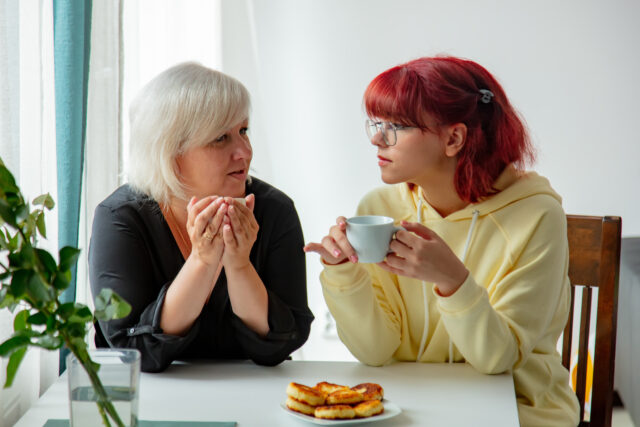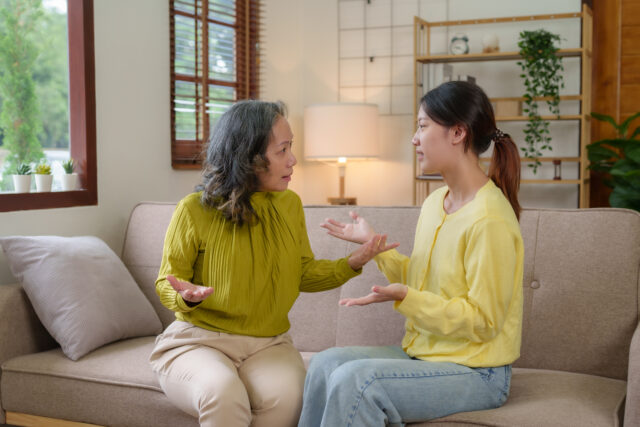Parenting doesn’t stop when your children become adults, but the dynamics certainly change.

As they become more independent, they’ll likely start sending some not-so-subtle signals that they need more space. It’s tough to accept them, but noticing that they’re asking you to back off a bit is a must if you want to keep a healthy relationship with them.
1. They’re giving you one-word responses to your questions.

If your usually chatty child has suddenly become a master of monosyllabic answers, they might be feeling overwhelmed by your inquiries. When “How’s work?” is met with a simple “Fine” instead of a detailed rundown, it could be a sign they need some breathing room. Try scaling back on the interrogations and let them volunteer information when they’re ready.
2. They’re not picking up your calls as often as they used to.

Remember when they’d answer on the first ring? If your calls are now going to voicemail more frequently, it might not be because they’re too busy. They could be feeling smothered by constant check-ins. Instead of calling daily, try setting up a weekly catch-up time that works for both of you.
3. They’ve stopped sharing details about their romantic life.

If your child used to gush about their dates but now changes the subject when relationships come up, they might be establishing boundaries. Prying into their love life could push them further away. Let them know you’re there if they want to talk, but don’t force the issue.
4. They’re making decisions without consulting you first.

Gone are the days when they’d ask your opinion on everything. If they’re making major life choices without asking for your input, it’s a clear sign they’re asserting their independence. While it might sting, it’s a healthy part of growing up. Show interest in their decisions without questioning their judgment.
5. They’re visibly tense when you offer unsolicited advice.

Pay attention to their body language when you start doling out advice. If they’re crossing their arms, avoiding eye contact, or sighing heavily, they might be feeling patronised. Try asking if they want your opinion before offering it. Sometimes, they just need a listening ear, not a problem-solver.
6. They’re spending more holidays with friends or their partner’s family.

If your child is opting out of family gatherings more often, it could be a sign they need space. While it’s natural to feel hurt, remember that they’re building their own life and traditions. Be flexible with holiday plans and show understanding when they can’t make every family event.
7. They’ve stopped sharing their location with you on their phone.

If they’ve suddenly turned off the location sharing feature you’ve had since they were teens, take the hint. They’re setting a clear boundary about their privacy. Resist the urge to question this decision or demand they turn it back on. Trust that they’ll reach out if they need you.
8. They’re being vague about their weekend plans.

When “What are you up to this weekend?” is met with a non-committal “Oh, just this and that,” they might be avoiding your judgment or interference. Resist the urge to pry. Show interest without demanding details, and they’ll likely share more when they feel comfortable.
9. They’re deflecting your questions about their finances.

Money talks can be touchy, especially between parents and adult children. If they’re changing the subject when you inquire about their savings or career progress, it’s a sign they want financial independence. Unless they ask for help, assume they’re managing their money on their own terms.
10. They’re setting firm boundaries around visits to their home.

If they’re insisting on advance notice before you pop by, or limiting the duration of your stays, respect these boundaries. It’s not a rejection of you, but a healthy assertion of their space. Show that you value their home and time by adhering to their preferences without complaint.
11. They’re not sharing as much on social media as they used to.
 Source: Unsplash
Source: Unsplash If your once-prolific poster has gone quiet on Facebook or Instagram, it might not be because they’re less active. They could be curating what you see to maintain some privacy. Avoid commenting on this change or questioning them about posts you can’t see. Trust that they’ll share what they want you to know.
12. They’re correcting you when you give them nicknames or use pet names.

Your “little pumpkin” might not appreciate that moniker in front of their colleagues or partner. If they’re asking you to use their actual name, especially in public, it’s a clear sign they want to be treated as an adult. Respect their preference, even if it’s hard to let go of those cherished childhood names.
13. They’re not asking for your help with tasks they used to.

If they’re no longer calling you to fix a leaky tap or decode a confusing email, it’s a sign they’re building confidence in handling things solo. While it’s tempting to offer help, wait for them to ask. Celebrate their growing self-reliance instead of feeling left out.
14. They’re being selective about what family information they share with you.

If you’re finding out about family news from other people instead of directly from your child, they might be establishing themselves as a separate unit. This is especially common if they have their own family now. Respect their right to manage their own relationships and information flow within the extended family.
15. They’re gently reminding you that they’re adults now.

If phrases like “I’ve got this, Mum” or “Dad, I’m not a kid anymore” are becoming more regular, take note. These are direct communications that they need you to see them as capable adults. Try to catch yourself when you’re slipping into old parenting patterns and adjust your approach.
16. They’re expressing gratitude for your support but asserting their independence.

When they say things like “Thanks for offering, but I’d like to handle this on my own,” it’s a positive sign. They’re acknowledging your willingness to help while clearly stating their need for autonomy. It’s a healthy balance to strive for in your evolving relationship.




